- Home
- Norman, John;
Magicians of Gor Page 10
Magicians of Gor Read online
Page 10
"True," said the first.
"Read to me," begged a fellow looking up at the boards. "I cannot read. What does it say?"
"'Greetings from Lurius of Jad, Ubar of Cos, to the people of Glorious Ar,'" read a man, rather slowly, pointing to letters with his fingers, which led me to believe that his literacy was not likely to be much advanced over that of the other. To be sure, I myself did not read Gorean fluently, as the alternate lines change direction. The first line is commonly written left to right, the second from right to left, and so on. Cursive script is, of course, at least for me, even more difficult. In particular I find it difficult to write. In defense I might point out that I can print Gorean fairly well, and can sign my name with a deftness which actually suggests to those who do not know better that I am fully literate in the language. In further defense I might point out that many warriors, for no reason that is clear to me, seem to take pride in a putative lack of literacy. Indeed, several fellows I have known, of the scarlet caste, take pains to conceal their literacy, seemingly ashamed of an expertise in such matters, regarding such as befitting scribes rather than warriors. Thus, somewhat to my embarrassment, I found I fitted in well with such fellows. I have known, incidentally, on the other hand, several warriors who were quite unapologetic about literary interests and capacities, men who were, for example, gifted historians, essayists, and poets.
"'Know, people of Glorious Ar,'" the man continued to read, "'that Cos is your friend.'"
"Does it say that?" asked a man.
"Yes," said the fellow, determinedly. He then continued to read. "'Cos has no quarrel with the people of Ar, whom it reveres and respects. The quarrel of Cos is rather with the wicked and corrupt regime, and the dishonest and ruthless policies, of Gnieus Lelius, subverter of peace, enemy of amity between our states. It was only with the greatest reluctance and most profound regret that Cos found herself, after all avenues of conciliation and negotiation were exhausted, forced to take up arms, in the name of free peoples everywhere, to resist, and call to account, the actions and policies of the tyrant, Gnieus Lelius, enemy to both our states.'"
"I did not know Gnieus Lelius was a tyrant," said a fellow.
"That is absurd," said another.
"But it is on the public boards!" said another.
"It must be true," said another.
"Who made these postings?" asked a man.
"The members of the palace guard, the Taurentians themselves," said another.
"They must then be true," said another.
"No," said a fellow. "All that is being done here is to inform us of the message of Lurius of Jad."
"True," said another, relievedly.
"Read on," said a man.
"'Now, with sadness, given no choice, with the support and encouragement of all the world, now allied with me, I, Lurius of Jad, who would be your friend and brother, have been forced to come before your gates. The Priest-Kings are with me. My arms are invincible. I have conquered in the delta. I have conquered in Torcadino. I have conquered but three day's march from your very gates. Resistance to me is useless. Yet, although Ar, under the tyranny of Gnieus Lelius, has been guilty of many crimes and my patience has been sorely tried, I am prepared to be merciful. I offer you the alternatives of annihilation or friendship, of devastation or prosperity. Make your decision not rashly, but with care. Do not force me to give Ar to the flames. Rather let us live in peace and brotherhood.'"
"Is there more?" asked a man.
"A little," said the fellow who was reading.
"What?" he was asked by several about.
"'If Ar desires peace, and would survive, if she desires peace, and would be freed of the onerous yoke of a tyrant, let her deliver to my plenipotentiary, Myron, polemarkos of the continental forces of the Cosian ubarate, some sign of her desire for peace, some evidence of her hope for reconciliation, some token of her good will.'"
"What does he want?" asked a man.
"Is Gnieus Lelius a tyrant?" asked a fellow.
"There is the matter of the ostraka," said a man.
"And the permits!" said another.
"Tyrannical actions!" said another.
"Gnieus Lelius is a tyrant," said another.
"Absurd," said a fellow.
"He is soft, weak, vacillating," said a man.
"He is not a Ubar," said another, "but, too, he is surely not a tyrant."
"He is a weak fool," said another.
"But not a tyrant," said a man.
"No," said another.
"There is the matter of the ostraka, the permits, the restrictions," said another.
"That is true," said another.
"Perhaps he is a tyrant," said a man.
"Perhaps," said another.
"Yes," said another. "He is a tyrant!"
From the public postings, I had now gathered that Gnieus Lelius was not likely to have been of the party of treachery in Ar, which I was pleased to learn. To be sure, he might have been of that party, and might have been, in the developments within that party, outmaneuvered, to find himself suddenly cast in the role of a scapegoat, something to be thrown to the crowd, to satisfy it and protect others. On the other hand, from what I knew of Gnieus Lelius, whom I had met, I guessed he was an honest man. Indeed, in another time and place, it was my speculation that he might have served as an efficient, beloved administrator. I suspected that he was at worst a dupe, a trusting man, perhaps even one of considerable talent, who had found himself, through no real fault of his own, a pawn in games of state, games in which there seemed to be no rules other than survival and victory.
"Read further," demanded a man.
"That is the message," said the fellow who had been reading it. "There is no more."
"No more?" asked a man.
"Only 'I wish you well. Lurius of Jad, Ubar of Cos,'" said the fellow.
"But what does Cos want?" asked a man.
"Apparently she wants some sign of our desire for peace," said a fellow, looking up at the posting.
"Tell them to go back to Cos," said a fellow, angrily, "and we shall consider the matter."
"The posting refers to some evidence of our hope for reconciliation," said the first fellow, "some token of our good will."
"Give them our steel in their neck!" said a fellow.
"And with good will!" said another, a fellow of the potters.
"That is a token they will understand," added another.
"But what do they want?" asked another.
"They may want our Talena," said a man.
"That brave and noble woman, we will never surrender her!" said another.
"I myself would block the gate," said a fellow, "before I would see her leave the city at the stirrup of a Cosian envoy."
"She has offered so to sacrifice herself," said a man.
"It is here on the public postings," said another, "over here."
"They cannot have our Talena," said a man.
"I do not think it is Talena they want," said a man.
"But what, then?" asked another.
"What could be a suitable token of Ar's desire for peace?" asked another.
"Who wants peace?" said a man.
"I do not understand what is going on," said a fellow.
"Those who are high in the city," said a fellow, "will inquire into these matters. They are wiser than we and will do what is best."
At this point there was much shouting in side streets, coming from the west. In moments, too, men were shouting about us.
"Cos!" they cried. "Cos can be seen from the walls!"
I did not think, in these times, that they would let civilians ascend the walls. Otherwise I might have hastened to the ramparts. From them, I gathered, might be viewed the legions of Cos. Such armies appear first like small lines at the horizons. It is often difficult, at first, to mark out the units. Sometimes, on sunny days, there is a flashing along the horizon, from lifted standards. At night one can usually see the fires of the camps, three or fo
ur pasangs away. To be sure, what might be visible from the walls now might be only smoke from fired fields or, more likely, dust from tharlarion cavalries.
"Are the Cosians numerous?" asked a man.
"They are like the leaves of trees, like the sands of the sea," said a man.
"Look, overhead!" cried a man.
We saw a Cosian tarnsman over the city.
"Ar is doomed," said a man.
"We will fight to the death," said another.
"Perhaps we can treat with the Cosians," said another.
"Never!" said another.
"Way, make way!" we heard. Now, moving south on the Avenue of the Central Cylinder, toward the great gate of Ar, were several riders of tharlarion.
"That is the personal banner of Seremides!" said a man.
The riders were muchly cloaked. From the precision of their lines, however, and the ease and discipline of their seat on the tharlarion, I took them to be soldiers. Too, if the fellow was right, that one of the banners in the group was that of Seremides, then presumably he, or his empowered agent, was one of the riders.
"Save us, Seremides!" cried a man.
Then the riders had passed.
"Where is Gnieus Lelius, the regent?" asked a man.
"He has not been seen in public in days," said another.
"Perhaps he has fled the city!" suggested another.
"Tonight," said another, "let our gates be sealed."
"I have heard," said a fellow, "that Cos is our friend, and that it is Gnieus Lelius who is the enemy."
"That is absurd," said a man.
"Last night, Cosian scouts, outside the walls," said a man, "distributed silver tarsks to the homeless, assuring them of the good intentions and friendships of the maritime ubarate!"
"That is preposterous," said a man.
"I know a fellow who received one," said the first fellow.
"Unfortunately," said a fellow, "I was home in bed."
"You should have been outside the walls," said another.
"I could use a silver tarsk," said a man.
"Do you think that Cos is truly our friend?" asked a man.
"No," said a fellow.
Men looked at him.
"Why do you say that?" asked a man.
"I was in the delta," he said, and turned away.
"Ar's Station," said a man, "has been well treated by Cos."
"Do not respond to that," I said to Marcus, and drew him back a bit from the public boards, to the edge of the crowd. The young warrior's face was flushed.
"Perhaps Seremides can save us," said a man.
"Or the intercessions of our beloved Talena," said another.
"We must fight to the death," said a man.
"Cos will show us no mercy," said another.
"Perhaps the city will be spared if we confess our wrongs, and make clear our desire for peace."
"What wrongs?" asked a man.
"Surely we must have wrongs," said a man.
"I suppose so," said another.
I myself could think of at least three, the failure to meet Cos at Torcadino, the failure to relieve the siege at Ar's Station, and the unprepared entry into the delta, in putative pursuit of the Cosian expeditionary force in the north.
"We can do nothing," said a man.
"We are helpless under the tyranny of Gnieus Lelius," said another.
"Who can free us from the grip of this tyrant?" asked a man.
"Perhaps our friends in Cos," said a fellow.
"Where is he?" asked a man.
"Hiding in the Central Cylinder," said another.
"He has fled the city," said another.
"Ar cannot be indefinitely defended," said a man.
"We must declare ourselves an open city," said another.
"I do not know what is to be done," said a man.
"Others wiser than we will know," said another.
"How can we make Cos know we wish to be their friend?" asked another.
"I do not wish to be their friend," said a man, angrily.
"Our military situation is hopeless," said a man. "We must prove our desire for peace to the Cosians."
"How can we do that?" asked a man.
"I do not know," he said.
"They will wish some clear, explicit token," said a man.
"Yes," said another.
"But what?" asked a man.
"I do not know," said the first fellow.
"Come along," I said to Marcus.
In a few moments we had come to a slave ring where we had left Phoebe.
The ring to which she was attached was set quite close to the ground level, a ring to which it was presumed a slave might be fastened by the ankle. Marcus, however, using a pair of slave bracelets, had fastened her to it by the neck, one bracelet about the ring, the other about her collar, pressing into her neck. She lay on her stomach on the stones, her neck held close to the ring, her eyes closed against glare. Marcus kicked her, not gently, with the side of his foot. "Master," she said, and rose to her knees, bent over, her head held down to the stones.
"She is Cosian," he said to me.
"No," I said. "She is only a slave."
"Are you hungry?" Marcus asked Phoebe.
"Yes, Master," she said.
"Perhaps then," he said, "you will not be fed today."
"I am not permitted to lie to my master," she said.
"A slave, like any other animal," I said, "may grow hungry."
"True," said Marcus.
He then crouched down and removed the bracelets from the ring and collar.
"I, too, am hungry," I said.
"Very well," he said.
"There are food shops on Emerald Street," I said.
"Is it far?" he asked.
"No," I said.
Then, in a moment, we left, retracing our steps, moving north on the Avenue of the Central Cylinder, past shops, fountains, columns and such, until we would make our left turn, toward Emerald Street, Phoebe heeling him, her hands now fastened behind her in the bracelets.
"Look," I said, while still on the Avenue of the Central Cylinder, pointing upward.
"Another Cosian tarnsman," he said.
"Yes," I said.
"Coppers, coppers for the temple," called an Initiate, rattling some tarsk bits in a tray.
"What do you think Cos wants?" asked Marcus.
"I think," I said, "the destruction of the gates of Ar."
"That is absurd," said Marcus.
"True," I said.
"They will never be given that," he said.
"No," I said.
7
Ar is Liberated
We were muchly jostled.
"Hear the bars?" asked Marcus.
"They are sounding out peals of rejoicing," I said.
It was now two days after we had read the first postings of the conciliatory message of Lurius of Jad on the public boards.
"Hail Ar! Hail Cos!" cried folks about.
It was difficult to keep our feet.
"Are they coming?" asked a man.
"Yes," said another, moving out further onto the avenue.
"Back," said a guardsman. "Back."
We had come to this coign of vantage, such as it was, very early this morning, even at the second Ahn. Yet, even at that time, many had been about, some with blankets to sleep on the stones. It was in the open area near the Central Cylinder, which loomed in the center of a circular park, the territory open enough for defense, midway in the avenue.
"Hail Ar! Hail Cos!" cried a man.
Many folks held small Cosian banners which they might wave. Banners, too, of Ar were much in evidence.
The night before last, the night of that day on which we had taken note of the postings, the gates of Ar had been dismantled and burned. Some citizens had attempted to interfere with this, but were discouraged with clubs and blades. There had even been sporadic mutinies of small contingents of guardsmen, determined to hold their posts, but these for
the most part dissipated when it became clear that the orders were from the Central Cylinder itself. Two of these armed reluctances, yielding neither to reason nor orders, were quelled bloodily by Taurentians. Gnieus Lelius, it seems, had been deposed, and Seremides, in a military coup he himself characterized as regrettable, had seized temporary power, a power to be wielded until the High Council, now the highest civilian authority in Ar, could elect a new leader, be it Administrator, Regent, Ubar or Ubara.
"I had not thought to see the gates of Ar burned, not by her own," said Marcus.
"No," I said.
The metal plating had been pried from them, to be melted down. The great timbers then, shattered and separated, had been formed into gigantic pyres and burned. I think the light of these would have been visible for fifty pasangs. Marcus and I, and Phoebe, had watched the burning of the great gate for a time. Many folks from the city, too, some in numbness, some in sorrow, some in disbelief, had come out to watch. We could see their faces in the reflected light. Many had wept. Some uttered lamentations, tearing their hair and clothes. It had been uncomfortably hot even within a hundred paces of the flames, so great was the heat generated. I had come through that gate many times.
We could hear cheering in the distance.
"Cos is within the city," said Marcus.
"At last we are free!" cried a man.
"We have been liberated!" cheered another, waving a Cosian banner on a small stick.
The city was festooned with ribbons and garlands. It was hard to hear Marcus beside me, what with the sound of the bars ringing and the shouts of the crowd.
"Has there ever been such a day for rejoicing in Ar?" asked a man.
"I do not know," I admitted. After all, I was not of Ar.
I could hear trumpets and drums in the distance.
"Do you think Cos will now sack and burn the city?" asked Marcus.
"No," I said.
"They are within the walls," he said.
"Selected, controllable contingents, probably mostly regulars," I said.
"You do not expect them to burn Ar?" he asked.
"No," I said. "Ar is a prize, surely more valuable as she is, rather than in ashes."
"Is the population not to be slaughtered?" he asked.
"I would doubt it," I said. "There is a great pool of skills and talent in Ar. Such things, too, are prizes."
"But surely they will sack the city," he said.

 The Emperor
The Emperor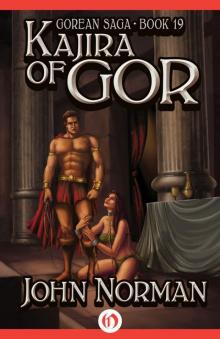 Kajira of Gor
Kajira of Gor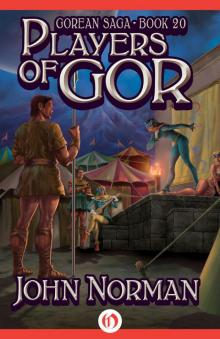 Players of Gor
Players of Gor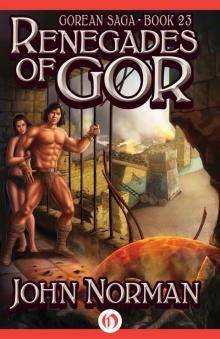 Renegades of Gor
Renegades of Gor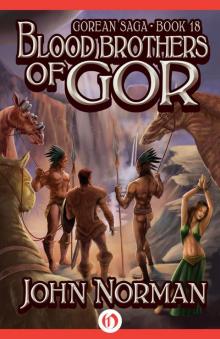 Blood Brothers of Gor
Blood Brothers of Gor Plunder of Gor
Plunder of Gor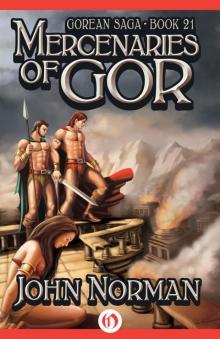 Mercenaries of Gor
Mercenaries of Gor Raiders of Gor
Raiders of Gor Gor 30 - Mariners of Gor
Gor 30 - Mariners of Gor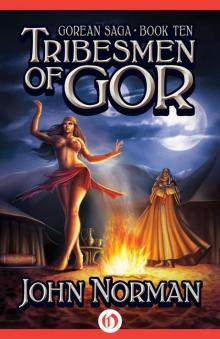 Tribesmen of Gor
Tribesmen of Gor Magicians of Gor
Magicians of Gor Mariners of Gor
Mariners of Gor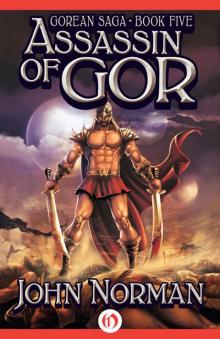 Assassin of Gor
Assassin of Gor Vagabonds of Gor
Vagabonds of Gor